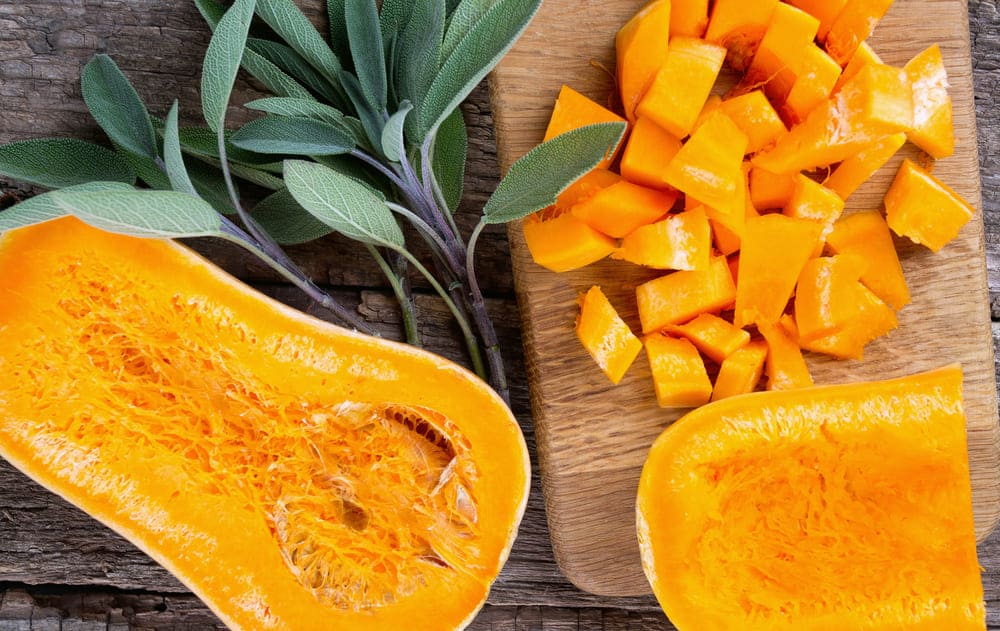
Butternut squash, pumpkin, or gramma is an orange layered fruit. It has a sweet, earthy, or nutty flavor. Its culinary uses are versatile as you can add them to any savory or sweet dish.
In cooking, it is used as a vegetable. You can roast, sauté, toast, mash, or make a puree of these sweet delights. You can utilize it in soups, bread, pies, lasagna, and casseroles.
The butternut squash has extensive usage because of its unique taste and health benefits. However, if you do not have any at home or want to try out new options, go through some butternut squash substitutes we have mentioned.
A famous way of using butternut squash is by roasting. You can squash the seeds and convert them into oil which can be used for cooking, on popcorn, or salad. The health benefits outweigh everything else.
You can eat a bowl stuffed with butternut squash and sprinkle some mushrooms, onions, seasoning, and onions. Here you have an easy-to-make yet a nutritious bowl of flavorful ingredients.
These are rich in fiber, various minerals and vitamins (mainly A and C), and antioxidants. Hence, their impact in terms of nutrition is high.
Butternut Squash Substitute
1) Acorn squash
A top candidate for butternut squash substitute is acorn squash. It is rich in fiber and has a milder taste. The taste and texture of acorn are closely related to butternut. Butternut squash skin is hard to peel off but is versatile.
Thus, it can be used in a variety of dishes. Butternut squash does not have very hard skin to peel off. So, the acorn is better when it comes to roasting, whereas butternut is good for soups. The acorn squash is small in size and the flesh is sweet on cooking. Hence, we can say acorn is a great alternative for butternut squash.
2) Buttercup squash
This winter squash has a sweet and creamy taste. It has beautiful dark green skin and requires heat for fruit production. It is rich in Vitamin C and other carotenoids, which makes it a healthy substitute for butternut squash. Carotenoids are great for eye health.
The taste is similar to butternut and so is its usage in the culinary world. Steam or bake this squash and use it in any dish. Squash, generally, forms a great base for soups. So, as an alternative, buttercup squash is a great choice.
3) Hubbard squash
The outer look of hubbard squash may not be impressive but inside it has a rich flavor. The inner material is dense and tender. Unlike buttercup, it has hard skin and can be cooked by roasting it. When roasted, use it for soups and purees. The taste is sweet like a pumpkin. It contains fiber and vitamins like A and C. So, use Hubbard as a great replacement for butternut squash.
4) Delicata squash
A member of the winter squash, it has a small size. However, the taste is sweet and like potatoes. Delicata is nutrient-rich, and its skin is edible. So, you do not need to peel off the skin and can roast it by sprinkling some salts and spices. You can roast, bake, steam, or eat it as is to enjoy its sweet and creamy flavor.
The number of carbs in this squash is much lower than all other types. It contains fiber, potassium, vitamins A and C.
5) Sweet potatoes
They get their name from their sweet taste. Like all other substitutes, sweet potatoes are highly nutritious. The cooking time for sweet potatoes is less than regular ones. You can use this type in the same way as a regular potato. You can substitute it for butternut squash, in case you do not have anything else available.
Thus, we can say that squash is a top ingredient in our culinary world. Butternut squash has a unique and flavorful taste. It can be used in various ways and dishes. However, when butternut squash is unavailable, you can go for all the alternatives we have mentioned above.
These substitutes may have some differences but most of them give a similar taste profile. Each has a distinct quality and can either be roasted, steamed, sauteed, or cooked. Thus, choose according to your need. Create something that your family will always remember.